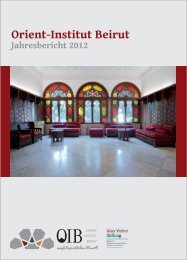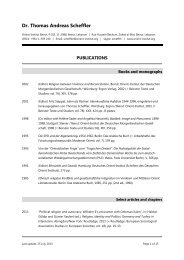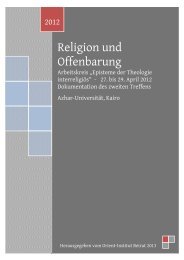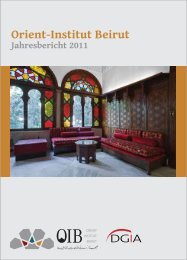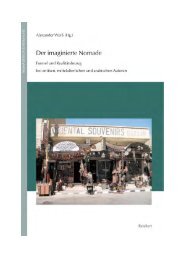Orient-Institut Beirut
Orient-Institut Beirut
Orient-Institut Beirut
Erfolgreiche ePaper selbst erstellen
Machen Sie aus Ihren PDF Publikationen ein blätterbares Flipbook mit unserer einzigartigen Google optimierten e-Paper Software.
3b. Die bereits im letzten Jahr (Dezember 2007) in <strong>Beirut</strong> begonnene und im Oktober 08 in<br />
Istanbul fortgesetzte Dichter-Begegnung reziproker Übersetzung und Nachdichtung gehört<br />
auch in diese Forschungsperspektive.<br />
3c. Für Februar 09 ist eine Veranstaltung in Zusammenarbeit mit dem Goethe-<strong>Institut</strong> zu<br />
„Warum Dichtung übersetzen?“ geplant.<br />
4. Für das assozierte Vorhaben „Akteure und ihre Lebenswelten: Die Transformation der<br />
Stadt Tripoli (Libanon) während des „langen“ 19. Jahrhunderts“ wurde ein<br />
Verlängerungsantrag eingereicht. S. Leder ist dabei Mitantragsteller.<br />
5. Die Planung eines Projekts, das gemeinsam mit dem <strong>Orient</strong>-<strong>Institut</strong> <strong>Beirut</strong> / Istanbul und<br />
dem İslam Araştırma Merkezi (Istanbul) geplant ist, stellt Ansätze zur politischen<br />
Theoriebildung im Nahen Osten in den Mittelpunkt. Der Diskussionsstand wird<br />
gegenwärtig noch in dem Vorschlag des <strong>Orient</strong>-<strong>Institut</strong>s zusammengefasst.<br />
In Planung<br />
The <strong>Orient</strong>-<strong>Institut</strong> <strong>Beirut</strong> and Istanbul want to propose cooperation with ISAM for research on historical<br />
advice literature combining fiqh, secular wisdom traditions and approaches to political theory. The<br />
cohabitation of religious and secular teachings and of local and universal concerns and perspectives seems<br />
particularly appealing for a whole range of research interests. An exploration of this productive and wide<br />
spread branch of Islamic thought promises a contribution to contemporary debates linking them to history.<br />
The period which we suggest to focus on dates from the 14 th century onwards and includes Arabic, Ottoman<br />
and Persian texts. Much of the material is little known, and some of it is completely unknown. This state of<br />
affairs stands out in sharp contrast to the dynamic, variance and spread of such treatises. They often were<br />
commissioned by political administration and in fact must be considered part of court culture, power<br />
structures and political debates of their day. This literature is an important source of historical notions and<br />
practices regarding good governance, justice and legitimacy. Last not least, the didactic propensity of this<br />
literature relates it to elite education.<br />
The <strong>Orient</strong>-<strong>Institut</strong> <strong>Beirut</strong> presently conducts advanced research related to that field and may provide a<br />
detailed bibliographical survey. The <strong>Orient</strong>-<strong>Institut</strong> Istanbul is interested in contributing to this research. In<br />
order to envisage a concerted activity on a larger scale, bringing this important branch of Islamic thought<br />
somewhat more under focus and into light, we are looking for a partner, who could contribute to a series of<br />
studies, meetings and text editions which we would carefully plan for and publish together.<br />
(S. von Hees, S. Leder)<br />
9



